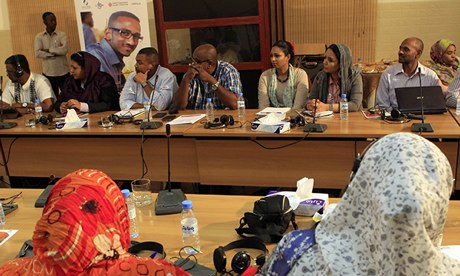Abda Yahia el-Mahdi has never heard of Alan Sugar, but she may soon be the Sudanese incarnation of the pugnacious Apprentice star.andnbsp;Sudan's most-watched television network β Blue Nile β will shortly broadcast the country's first Apprentice-style reality show, a format that programmers hope will shake up Sudanese television and indirectly boost Sudan's tanking economy. And Mahdi, a former finance minister, is being courted as one of the show's judges.
Mashrouy β Arabic for "my project" β will present 12 young Sudanese entrepreneurs pitching and developing their ideas for a creative start-up firm over the course of several episodes. The dozen hopefuls will be mentored β and ultimately eliminated β by four leading Sudanese businesspeople and economists β before viewers vote on the winner from a shortlist.
The Sudanese are no strangers to reality television, but locals say the premise of such a business-oriented show β which has drawn comparisons with Dragon's Den and the Apprentice β is unprecedented.
"Even the term 'creative entrepreneurship' is new in Sudan," said Mahir Elfiel, one of the show's co-ordinators. "There was no specific word for it before. And that's the idea behind the whole project β to introduce the concept here."
Sudan has a youth unemployment rate of 34% β one of several contributing factors torecent anti-regime demonstrationsandnbsp;in which more than 200 protesters were killed by state officials.
The cash-strapped government was once able to keep unemployment under control by employing many young jobseekers within the bowels of its ministries, but its empty coffers β reduced by state mismanagement and international sanctions β no longer allow for this.
"There is a limit to how many they can employ," said Mahdi. "The vacancies are in the hundreds, but the unemployed are in the thousands."
As a result, there is an increasing desire, inside and outside government, to encourage more investment in private enterprise β and Mashrouy, allocated a primetime slot on Sudan's most popular channel, is one attempt to inspire this change.
"If we can duplicate this kind of programme, I hope it will make a difference," said Mahdi. "It will help people get beyond the traditional thinking of getting employment in the government sector."
Most private enterprise in Sudan currently involves small, low-budget projects funded by micro-finance. Mashrouy aims to encourage graduates to create larger and more ambitious entrepreneurial projects β and to encourage banks to invest in them more readily.
Contestants include Mustafa Shaib, the hacker behind what he says will be Sudan's first tech company to focus exclusively on internet security, and English teacher Yassim Gasim, who wants to export spicy peanut butter β a popular Sudanese delicacy that is little known outside the country.
Gasim's previous experiences highlight why Sudan's business community is so excited about Mashrouy. Gasim first had the idea for his business five years ago β but couldn't find anyone willing to finance him, such are the restrictions on β and lethargy towards β investment in Sudan. As a result, he imagined that his horizons were limited to small low-tech micro-finance projects such as chicken-breeding. But more ambitious entrepreneurial projects seemed out of Gasim's reach β and even his vocabulary.
"The first time I read the wordandnbsp;riyada," said 38-year-old Gasim, referring to the word for entrepreneurship, "was when I saw the billboard for this show four months ago."
Sudan has no shortage of entrepreneurial small traders or self-employed day labourers. But with credit only available to those from rich families, the concept of a western-style entrepreneur β armed with a long term business plan, and backed by investors β is less well established.
So too is a business-based television show. "It's been challenging," said Elfiel, whose colleagues were forced to postpone filming because of the unrest in September. "We have stuff like American Idol, but nothing business-oriented like Apprentice or Dragons Den. No TV station has done this before."
